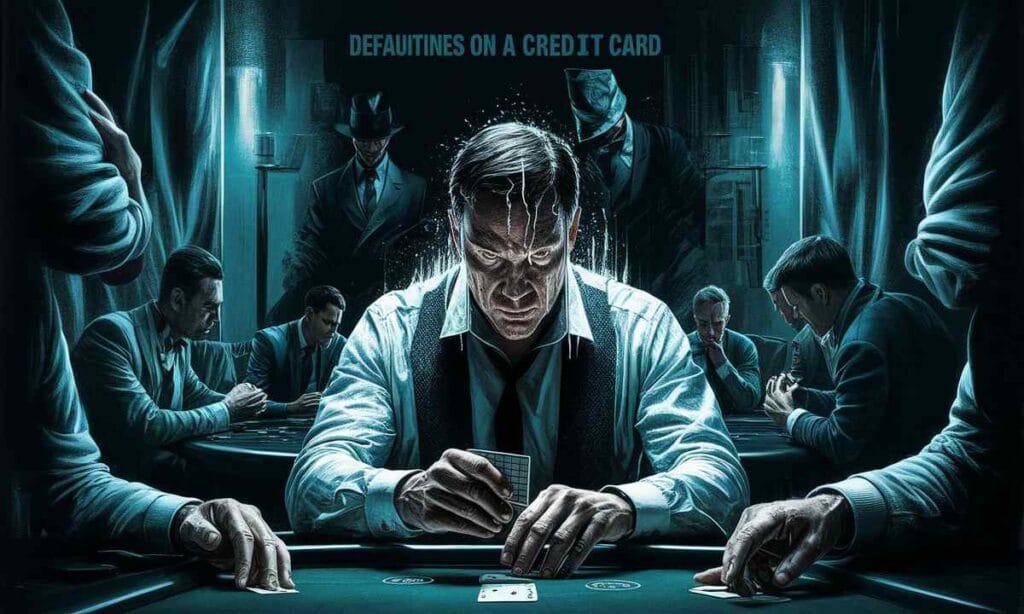TAKING in Credit Card Default: An Overview
Credit card default occurs when a cardholder fails to make required payments on their credit card account, leading to a breach of the cardholder agreement. Typically, this default is marked after a series of missed payments, often extending beyond 180 days. The implications of defaulting can be severe, affecting not just immediate financial stability but also long-term financial health. Understanding the dynamics of credit card default is essential for anyone navigating personal finance, as it directly impacts one’s creditworthiness and future borrowing capabilities.

The Importance of Addressing Credit Card Default
Addressing credit card default promptly is crucial to mitigate its adverse effects. Immediate action can prevent further damage to your credit score, limit additional financial penalties, and explore viable options for resolution. Early intervention not only helps in managing debt more effectively but also in preserving financial integrity and preventing the situation from escalating into more severe financial difficulties.
Immediate Consequences of Defaulting
What Happens When You Miss a Payment?
When a payment is missed, the initial consequence is typically a late fee, which compounds with each additional missed payment. Furthermore, the creditor will report the delinquency to credit bureaus, leading to a potential drop in your credit score. The credit card issuer may also increase your interest rate, which can exacerbate your financial situation, creating a cycle of escalating debt.
Fees and Penalties: The Financial Impact
The financial impact of defaulting includes several layers of fees and penalties. Initially, a late fee is charged, which can range from $25 to $40 per missed payment. Additionally, defaulting may trigger an increase in your annual percentage rate (APR), compounding the cost of your existing balance. Persistent default can also lead to additional fees such as over-limit charges or returned payment fees, further straining your financial resources.
How Defaulting Affects Your Credit Score
Defaulting on a credit card has a significant negative impact on your credit score. Initially, the missed payment is recorded, which can cause a dramatic drop in your score. The longer the default period, the more detrimental the impact on your credit score. A lower credit score affects your ability to secure loans or obtain favorable interest rates, ultimately influencing your overall financial health.

Short-Term Financial Repercussions
Increased Interest Rates and Charges
One of the immediate financial repercussions of defaulting is the increase in interest rates. Creditors often impose higher APRs on accounts in default as a penalty, which inflates the cost of carrying a balance. This increase in interest rates can make it significantly harder to pay down the existing debt and can lead to a cycle of accumulating interest and fees.
Impact on Monthly Budget and Financial Stability
The impact on your monthly budget is profound when defaulting on a credit card. Increased interest rates and late fees can disrupt your financial stability, leading to difficulty in managing your monthly expenses. This disruption often necessitates re-evaluating your budget, possibly cutting essential expenses, and reallocating funds to cover the increased debt payments.
Long-Term Effects on Credit
How Long Does a Default Stay on Your Credit Report?
A credit card default remains on your credit report for up to seven years from the date of the first missed payment. This extended period of visibility can significantly impact your creditworthiness, making it challenging to secure new credit or obtain favorable lending terms during this time.
Effects on Future Credit Applications
Defaulting on a credit card can have lasting effects on future credit applications. Lenders view defaults as a sign of financial instability, which can lead to higher interest rates, denial of credit applications, or reduced credit limits. This can make obtaining credit more challenging and costly in the future.
How Defaulting Influences Credit Scores Over Time
The influence of defaulting on credit scores can be long-lasting. Even after the default is resolved, the negative mark on your credit report can affect your credit score. Over time, as the default becomes older, its impact may diminish, but it can still affect your credit score and borrowing capacity for years.
Legal and Collection Actions
What Legal Actions Can Creditors Take?
Creditors have several legal actions available when dealing with a credit card default. These actions can include filing a lawsuit to obtain a judgment against the debtor, which can lead to wage garnishment or property liens. Understanding these legal avenues helps in preparing for potential consequences and seeking appropriate resolutions.
The Role of Collection Agencies in Credit Card Default
When a credit card account is significantly overdue, creditors may transfer the debt to collection agencies. These agencies are tasked with recovering the outstanding debt, often using aggressive tactics to secure payment. The involvement of collection agencies can further damage your credit score and add stress to the financial recovery process.
Understanding Garnishments and Liens
Garnishments and liens are serious legal consequences of defaulting on a credit card. A garnishment involves direct deductions from your wages or bank accounts to satisfy the debt. A lien places a legal claim on your property, which can complicate the sale or transfer of assets. Both actions highlight the severity of default and the importance of addressing debt issues proactively.

Recovery and Resolution Strategies
Steps to Take Immediately After Defaulting
Immediate steps after defaulting include contacting the creditor to discuss your situation and exploring potential solutions. This might involve setting up a payment plan, negotiating a settlement, or requesting a temporary forbearance. Prompt action can help in reducing additional penalties and starting the recovery process.
Negotiating with Credit Card Issuers for Relief
Negotiating with credit card issuers can provide relief options such as reduced payments, waived fees, or lower interest rates. Engaging in negotiations demonstrates a willingness to resolve the debt and can lead to more favorable terms. It is essential to communicate openly and clearly about your financial situation and potential solutions.
Exploring Debt Settlement and Repayment Plans
Debt settlement involves negotiating a reduced amount to settle the debt, while repayment plans provide structured payments over time. Both strategies can help in managing defaulted credit card debt but require careful consideration of the long-term implications, including potential impacts on your credit score and financial stability.
Rebuilding Your Credit After Default
How to Start Rebuilding Your Credit Score
Rebuilding your credit score after a default involves consistent, positive credit behaviors such as timely payments and responsible credit usage. Using secured credit cards or becoming an authorized user on another person’s credit card can help in re-establishing credit. Regularly monitoring your credit report and addressing inaccuracies is also crucial for improving your score.
The Role of Secured Credit Cards and Credit Counseling
Secured credit cards require a deposit that serves as collateral and helps in rebuilding credit. Credit counseling provides professional advice and budgeting assistance, helping you develop a plan for managing and improving your credit. Both options play significant roles in recovering from a credit card default.
Maintaining Good Financial Habits for Credit Repair
Maintaining good financial habits includes paying bills on time, avoiding excessive credit usage, and saving regularly. Adhering to a budget and managing debt responsibly are essential for credit repair and long-term financial health. Building a habit of financial discipline supports ongoing credit improvement and stability.
Preventing Future Defaults
Strategies to Avoid Defaulting on a Credit Card
Preventing future defaults involves strategic financial planning and proactive debt management. Strategies include setting up automatic payments, keeping track of due dates, and maintaining a budget to ensure timely payments. Building an emergency fund can also provide a safety net during financial difficulties.
Creating a Budget and Managing Credit Responsibly
Creating a budget involves tracking income and expenses to ensure that you can meet financial obligations, including credit card payments. Managing credit responsibly means using credit judiciously, avoiding excessive borrowing, and ensuring that you can meet payment obligations without compromising your financial stability.
Utilizing Financial Tools and Resources
Utilizing financial tools such as budgeting apps, credit monitoring services, and financial planning resources can aid in managing credit and avoiding defaults. These tools provide insights into spending patterns, credit scores, and financial health, enabling better decision-making and proactive debt management.
Seeking Professional Help
When to Consult a Financial Advisor
Consulting a financial advisor is beneficial when dealing with complex debt situations or seeking personalized advice on managing credit and finances. Advisors provide expertise in financial planning, debt management, and investment strategies, offering guidance tailored to your specific needs.
How Credit Counseling Agencies Can Assist
Credit counseling agencies offer services such as budgeting assistance, debt management plans, and credit education. They work with creditors to negotiate better terms and provide support in managing debt effectively. Choosing a reputable agency ensures reliable advice and effective assistance in resolving credit issues.
Exploring Bankruptcy as a Last Resort
Bankruptcy is a legal option for individuals unable to manage overwhelming debt. It provides relief through debt discharge or restructuring but comes with significant consequences for credit and financial future. Exploring bankruptcy should be considered as a last resort after evaluating all other debt management options.
BOTTOM LINE
Summarizing the Impact of Credit Card Default
Credit card default has profound effects on financial stability, credit scores, and future borrowing capabilities. Understanding the immediate and long-term consequences is crucial for managing the situation effectively and making informed decisions.
Final Tips for Managing Credit and Preventing Default
Managing credit responsibly involves proactive planning, budgeting, and maintaining good financial habits. Implementing strategies to avoid default and seeking professional help when needed can enhance financial stability and prevent future issues.
Frequently Asked Questions (FAQs)
How does credit card default impact your financial future?
Credit card default can significantly impact your financial future by causing a substantial drop in your credit score, making it difficult to obtain new credit or loans. It also results in higher interest rates and fees, which can exacerbate financial strain and lead to long-term financial challenges. The negative mark on your credit report can last for up to seven years, influencing your borrowing capacity and financial opportunities.
What steps should you take immediately after defaulting on a credit card?
Immediately after defaulting on a credit card, you should contact your credit card issuer to discuss your situation and explore options for relief. It is important to review your financial situation, create a budget, and possibly seek professional advice. Additionally, consider setting up a payment plan or negotiating a settlement to address the debt.
Can defaulting on a credit card lead to bankruptcy?
Yes, defaulting on a credit card can potentially lead to bankruptcy, especially if the debt becomes unmanageable. Bankruptcy is often considered a last resort when other debt relief options have been exhausted. It provides a legal framework to discharge or reorganize debts but has significant long-term effects on your credit report and financial status.
How can you rebuild your credit after a default?
Rebuilding your credit after a default involves consistent, positive credit behaviors such as paying bills on time, reducing debt, and maintaining low credit card balances. Using secured credit cards or becoming an authorized user on another person’s credit card can help re-establish credit. Regularly monitoring your credit report for errors and making corrections can also aid in rebuilding your credit.
What are the options for debt relief if you default on a credit card?
Options for debt relief include negotiating with creditors for a payment plan or settlement, enrolling in a debt management plan (DMP) through a credit counseling agency, or exploring debt consolidation loans. Bankruptcy is also an option for those who cannot manage their debt through other means. Each option has its own implications and should be carefully considered based on individual circumstances.
How can you prevent credit card default during financial hardship?
To prevent credit card default during financial hardship, create a detailed budget to manage expenses, prioritize essential payments, and communicate with creditors to explore relief options. Setting up automatic payments and building an emergency fund can also help manage financial difficulties and avoid default.
What role does credit counseling play in dealing with credit card default?
Credit counseling plays a crucial role by providing financial education, budgeting assistance, and helping you develop a debt management plan (DMP). Counselors work with creditors to negotiate better terms and can provide support in managing debt and improving financial habits.
Are there any government programs to help with credit card default?
Government programs specifically targeting credit card default are limited, but there are broader financial assistance programs and resources that can provide support during financial hardship. Programs such as the Financial Counseling and Education Program (FCEP) offer financial counseling services that can assist with managing debt and improving financial health.
How does defaulting on a credit card affect your ability to get new credit?
Defaulting on a credit card can severely impact your ability to get new credit by lowering your credit score and signaling financial instability to lenders. This may result in higher interest rates, reduced credit limits, or denial of new credit applications. Rebuilding your credit after a default can improve your chances of obtaining new credit in the future.
What are common mistakes to avoid when dealing with credit card default?
Common mistakes to avoid include ignoring the problem, failing to communicate with creditors, and making only minimum payments or no payments at all. It is also crucial to avoid taking on additional debt or using credit cards excessively while managing defaulted debt. Seeking professional advice and staying proactive in addressing the issue are key to effective resolution.
How long does a credit card default stay on your credit report?
A credit card default remains on your credit report for up to seven years from the date of the first missed payment. This extended period of visibility can affect your credit score and borrowing ability during this time.
What are the consequences of defaulting on a credit card?
The consequences of defaulting on a credit card include increased interest rates, late fees, and a significant drop in your credit score. It may also lead to legal actions, collection activities, and difficulty obtaining new credit. Defaulting can have long-term effects on your financial health and borrowing capabilities.
How can defaulting on a credit card affect your credit score?
Defaulting on a credit card can cause a substantial decrease in your credit score. The missed payments and resulting default are reported to credit bureaus, which negatively impacts your credit score and can influence your creditworthiness for years. The severity of the impact depends on the duration and frequency of the defaults.
Can you get a credit card back after defaulting?
Getting a credit card back after defaulting can be challenging. While it is possible to obtain a new credit card after rebuilding your credit, the process may involve higher interest rates and lower credit limits. Secured credit cards and rebuilding credit through responsible financial behavior can improve your chances of obtaining new credit.
What should you do if you can’t make a credit card payment?
If you can’t make a credit card payment, contact your credit card issuer immediately to discuss your situation and explore options such as a payment plan or temporary relief. Additionally, review your budget, prioritize essential expenses, and seek financial counseling if necessary to manage the situation effectively.
How can you negotiate with creditors if you default on a credit card?
Negotiating with creditors involves contacting them to discuss your financial situation and request relief options such as reduced payments, waived fees, or lower interest rates. It is important to be honest about your circumstances and propose a realistic plan for repayment. Effective communication and demonstrating a willingness to resolve the debt can lead to favorable outcomes.
What are the legal actions creditors can take if you default on a credit card?
Creditors can take several legal actions if you default on a credit card, including filing a lawsuit to obtain a judgment against you. This can lead to wage garnishment or property liens. Creditors may also involve collection agencies to recover the debt, which can add stress and further impact your financial situation.
How can you recover from a credit card default?
Recovering from a credit card default involves addressing the debt through negotiation or repayment plans, rebuilding your credit score with positive credit behaviors, and seeking professional advice if needed. Creating a budget, managing debt responsibly, and maintaining good financial habits are crucial for long-term recovery.
What are the best strategies to avoid defaulting on a credit card?
The best strategies to avoid defaulting on a credit card include creating a budget to manage expenses, setting up automatic payments to ensure timely payments, and maintaining an emergency fund to handle unexpected financial challenges. Additionally, regularly reviewing your credit reports and managing credit responsibly can help prevent default.









